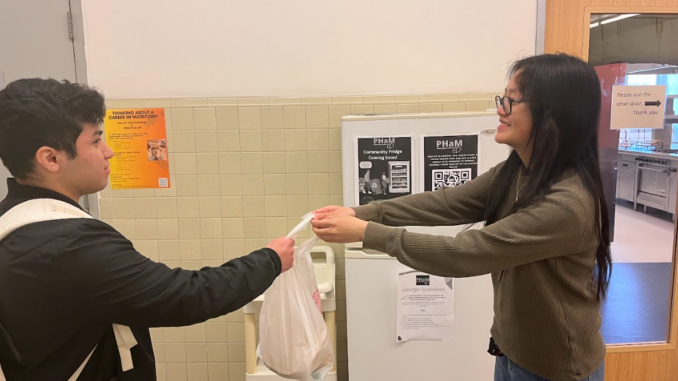
By T’Neil Gooden
Brooklyn College’s Public Health and Medicine Club (PHaM) opened a Community Fridge in 5129 Old Ingersoll on April 4.
This initiative was in collaboration with Nicole Cohen, director of the BC Food Pantry, providing PHaM with all the ingredients needed to create these meals.
“We reached out to Nicole Cohen, the director of the pantry, to collaborate with the fridge. The sustainability helped connect us with Cohen as well as getting the fridge donated by BC [New York Public Interest Group] (NYPIRG),” Natalie Wu, secretary of PHaM, told The Vanguard.
The food pantry is the main supplier of the PHaM community fridge. PHaM then gathers the different food items to make them into full meals.
“The food pantry is actually where PHaM gathers our ingredients to prepare meals. We pick up produce such as carrots, potatoes, celery, etc., and utilize these in the food lab to cook meals. In other words, the food pantry has the ingredients. PHaM gathers them to make meals,” Wu said.
The initiative comes at a time when BC’s own cafeteria has closed down due to a contract expiring with the vendor, requiring new food options through food trucks, as previously reported by The Vanguard. The goal of the fridge, according to board members of PHaM, was to provide BC students with more options for accessing food.
“Food insecurity has become a bigger problem ever since the cafeteria on campus stopped serving food. It’s been frustrating trying to find affordable, healthy foods to fuel us during our long, busy school days,” Wu told The Vanguard. “A community fridge on campus takes our food hunger worries away from us, making meals much more accessible plus, it’s free.”
The fridge will be supplied with new healthy meals weekly as the menu will be updated. Students can come to the pantry and pick up fully cooked meals ready to be warmed up and eaten.
“Students on campus can’t live off expensive food trucks forever. Besides, there tend to be limited options for students with various food preferences,” Wu said. “There is always a better option than pricey foods or just pure junk food. If this isn’t the perfect time to open up a free community fridge, I don’t know what is.”
With the closing of the food sections within our school cafeteria, this community fridge can provide students with available meals within our school vicinity.
“Due to the closing of the cafeteria on campus, a lot of the students had complained about the food trucks which were expensive and served unhealthy food,” Rhema Mills, vice president of PHaM, told The Vanguard. “As future doctors, nurses, and public health professionals, we knew it was the time to get active and do something about it. The community fridge was our past president Abena Dinizulu’s idea, and we knew it could be part of reducing food insecurity on campus.”
The demand for healthier options came even before the cafeteria shutdown on campus. The CUNY’s Campaign for Healthy Food (CHeF), as previously reported by The Vanguard, was a project that strived to make CUNY the healthiest urban public university in the country. It was used to help improve the healthy food choices of CUNY’s cafeterias and vending machines. Organizers hope that the fridge will be part of the continued efforts to introduce healthier options on campus.
“The goal of the fridge is to really provide an alternative to the other options on and around campus. We’ve learned in so many of our classes that food and the access to healthy options is a determinant of health,” Mills said.
Alan Gilbert, the Senior Vice President for Finance and Administration, sent an email on Jan. 31, 2024, to students explaining that progress has been made with the state of the BC cafeteria as they are finalizing solutions for more food services on campus. In the meantime, the community fridge is now a permanent staple for BC students to get daily lunch meals even after the cafeteria’s food services are in flux.
Students are able to pitch into the community fridge with donations of canned goods and other items. Before donating, students must contact the PHaM community to let them know the types of ingredients being added to their community before bringing them to the fridge location.
“We strive for students and faculty to no longer have to worry about what they’re going to eat or how much money they’re going to have to spend on their next meal,” Wu said. “We want to provide free, accessible, and fulfilling healthy meals on campus to everyone.”
Interested students who want to donate items to the community fridge can reach out via PHaM’s Instagram page, @bc.phamclub.
